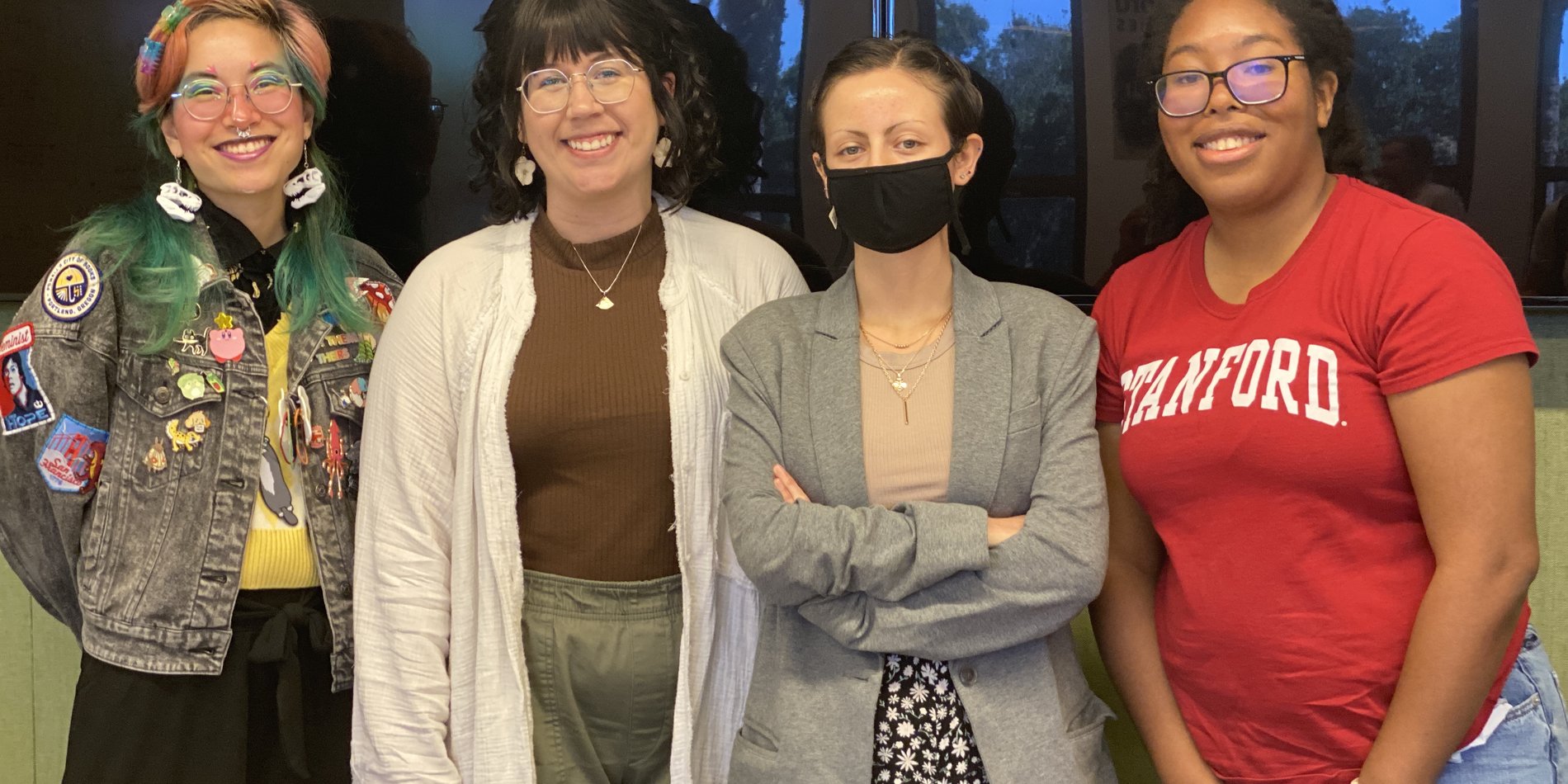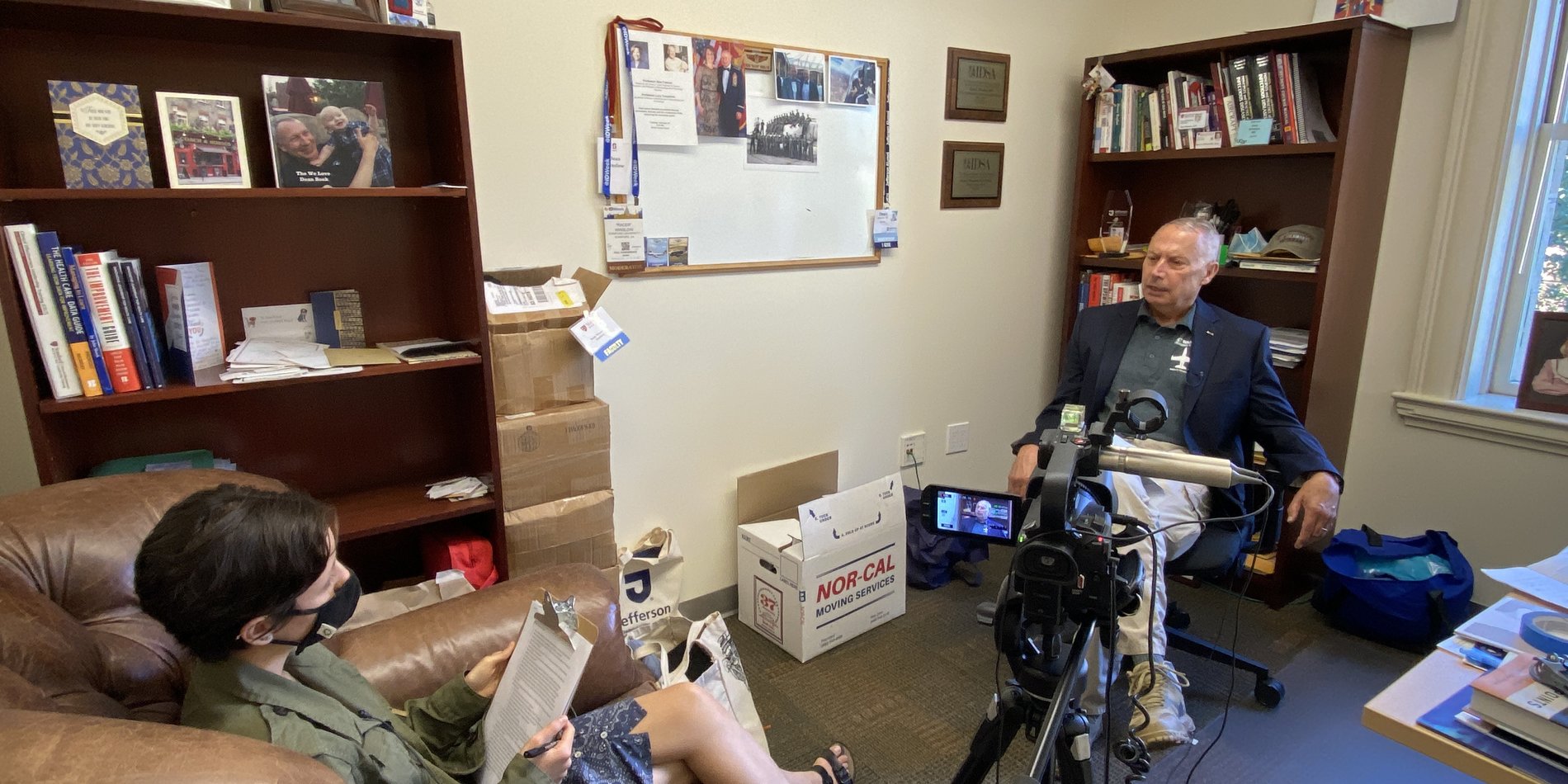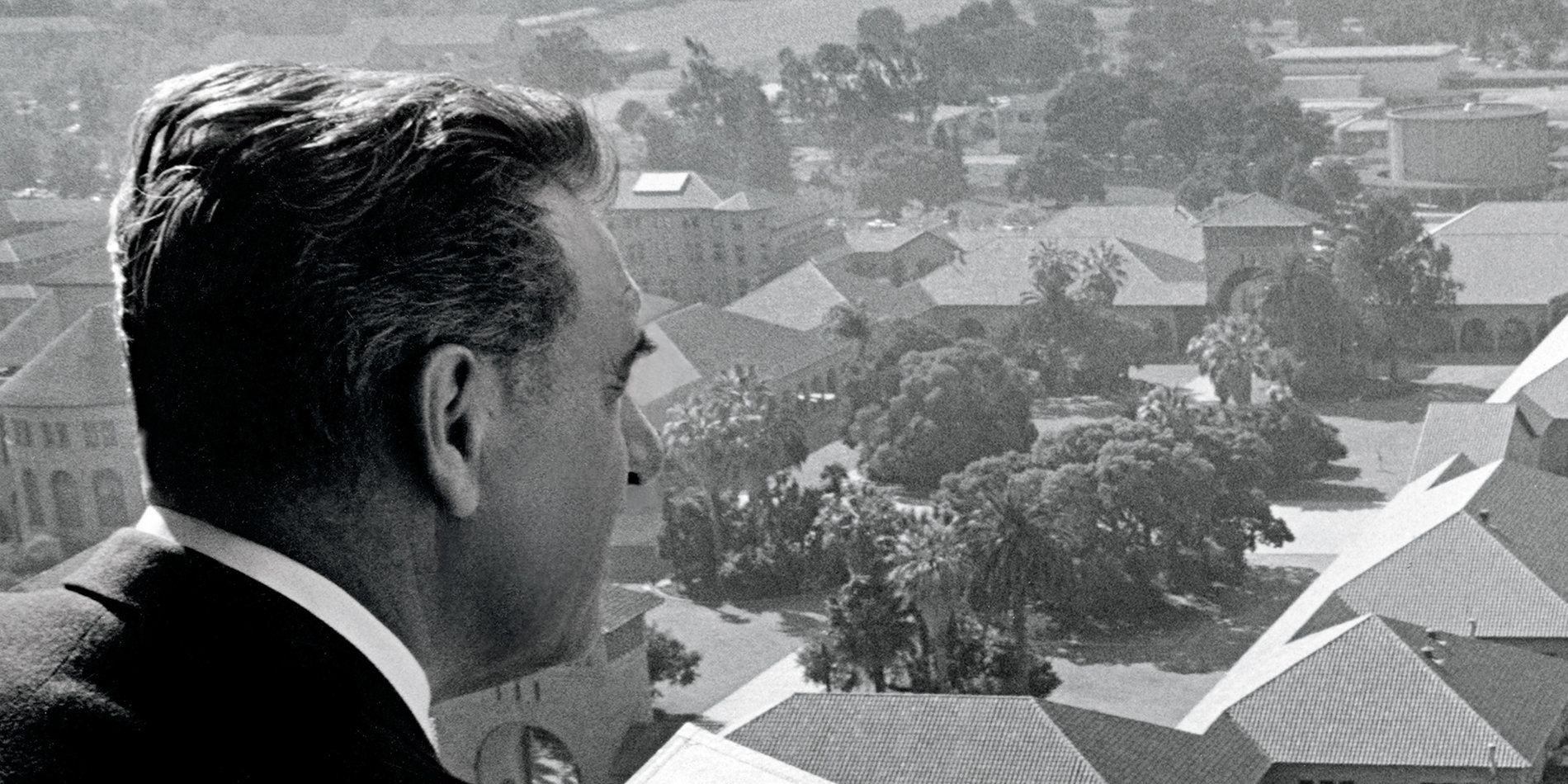Stanford Historical Society Summer Interns

University Archives and Oral History Interns Hana/Connor Yankowitz, Madison Bunderson, Jordan Pollock, and Arynn Carty (Stanford Historical Society)
The Stanford Historical Society (SHS) funded four student interns this summer – Arynn Carty and Jordan Pollock for the SHS Oral History Program, and Madison (Madi) Bunderson and Amari Dezbah Pierce for the University Archives.
Sponsored by the Stanford Historical Society Oral History Program, two Stanford undergraduate students spent the summer as oral history interns under the supervision of program staff Natalie Marine-Street and Makeda Barr-Brown. Founded in 1978, the Oral History Program explores the institutional history of the university through interviews with faculty, staff, alumni, trustees, and other members of the community. The program relies on student and volunteer interviewers and editors who have helped complete over 1,000 oral history interviews since its inception.
The interns, Arynn Carty and Jordan Pollock, conducted interviews, processed interview materials from Stanford faculty, staff, alumni, and community oral history projects to be deposited into the University Archives. They helped complete interviews and early edits for a project on the departmentalization of the African and African American Studies (AAAS) Program, organized early interviews for a new Asian American Pacific Islander (AAPI) alumni project, and interviewed for the program’s ongoing Covid-19 project.
Oral History Program Assistant Makeda Barr-Brown noted, “The interns had a wide range of responsibilities and offered skills that have really benefited the program. They’ve been instrumental in helping us reach our processing goals for the fiscal year and had a substantial part in ensuring our 2022 alumni reunion interviews are processed in a timely manner. They really made their mark on the program.”

Arynn Carty interviewing Paul Segall (Stanford Historical Society)
Both oral history interns gave presentations about their summer projects at a meeting near the conclusion of their internships. At this meeting, two of the University Archives’ summer interns who were partially sponsored by the Stanford Historical Society also made presentations.
Arynn Carty (Class of 2025) is pursuing a degree in history and earth systems. As an intern, Carty edited transcripts, wrote abstracts, compiled interviews, and conducted her own interviews for various projects, including the Alumni Stories, AAAS Departmentalization, Athletics, Faculty, and Stanford, COVID-19, and Crises of 2020-21 projects. When describing her experience, Carty stated, “I learned more about Stanford than I could have ever imagined and examined the ways in which oral histories contributed to building a robust historical record. Through this experience, I learned that oral history builds a tapestry of multiple perspectives, illustrates everyday practices of the past, and uncover stories that have been long buried.”
She was also able to process an Alumni Stories interview with Warren C. Hayman that she conducted during the academic year as part of the class History 200L: Doing Public History. In her final presentation and blog post, she spoke about how oral histories could be used to uncover stories that had been buried. She noted that Hayman “consistently mentioned that there were five freshmen women that were instrumental at the start of the BSU.” However, at the time, Hayman “and the other men of the BSU’s masculinity” would not allow them to highlight the role of the freshmen women. To Carty, that was a prime example of how oral histories can serve almost as a “healing” history.

Jordan Pollock interviewing Dean Winslow for the Stanford, COVID-19 and the Crisis of 2020 Oral History Project (Stanford Historical Society)
Jordan Pollock (Class of 2023) recently graduated with a degree in English and Creative Writing. Pollock was vital in helping the Oral History Program process interviews over the summer, as well as during the previous two academic years as a student worker with the Stanford Historical Society. As intern, she worked on the Alumni Stories, Disability at Stanford, Stanford, COVID-19, and Crises of 2020-21, and Movement oral history projects.
Reflecting on her summer internship, Pollock took a philosophical view on the creation of oral histories and their importance. She described oral histories as “the history of the experience of history.” She discussed how oral histories, especially the Alumni Stories, can be beneficial to students and can provide varying narratives about different sectors of society, achievement, and life after college. “As students on the precipice of various life trajectories, whose courses change with the smallest variance, we can see the paths of those that came before us and what the results were as we make decisions on our own paths,” she said in her blog post.

Amari Pierce (left) and Madison Bunderson (right) present the Stanford Disability and Disability Rights Advocacy Timeline, August 2023. (Photographs courtesy of Claudia Willett)
The University Archive interns, Madison (Madi) Bunderson and Amari Dezbah Pierce, launched the Stanford Disability and Disability Rights Advocacy Timeline in the summer of 2023 with funding and support provided by the Stanford Historical Society and the Stanford Archives. The timeline was built on the oral histories conducted in 2020-2023 through the Disability at Stanford Oral History Project.
Madison (Madi) Bunderson is a fourth-year doctoral candidate at the Stanford Graduate School of Education with a focus in developmental and psychological sciences. Her research combines narrative engagement and neuroscience. She is also a Leadership in System-wide Inclusive Education Fellow, funded by the U.S. Department of Education’s Office of Special Education, which has led her to being a teaching assistant for multiple education courses in disability studies.
Amari Dezbah Pierce is a rising senior studying symbolic systems. She has been an assistant coordinator for the Stanford Disability Community Space (DisCo Space) since its opening and is interested in language revitalization at the intersection of education and technology, accessibility, and, even more now, history!
When reflecting about how they hope the timeline will be used in the future, Pierce stated, “I hope that it will be useful for reflecting on how far or near disability rights and the disability experience has come at Stanford, as well as just understanding how things have stood before and how they stand now. I think, without the timeline, being in the disability community sphere at Stanford can feel like having a vague understanding of there being at least some infrastructure for supporting disabled students, but that there is still generally more to be improved.”
Bunderson adds to this by saying, “I hope that seeing this timeline draft reminds today’s students that they get to build on a legacy of wins, losses, struggles, and joys that have come before them.”
For more information about internship opportunities for Stanford students, visit the SHS website.
